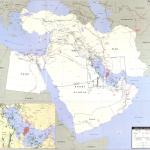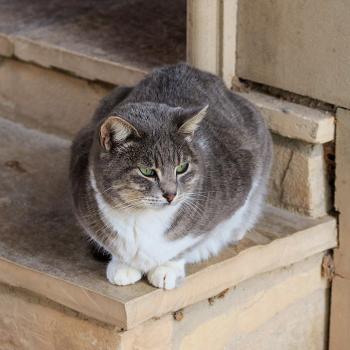We know so little about women in history, including the Bible. And yet they are there, all over. If we can’t imagine what discipleship could look like for ordinary people—half the population!—then following Jesus looks like something that you have to be either cranks or saints to do. The stories of women can illuminate a wider range of ways that we can follow God’s leading. They open windows into the many contexts in which human beings have tried to live as part of the Beloved Community. Mary Jesus’s mother provides us with a model of a peasant theologian, an ordinary woman who was the first disciple.
We know little about many women in the Bible, but we have more information about Mary than almost any other woman. Mary is often trotted out at Christmas as a vital part of the Nativity scenes, but shows up less in sermons the rest of the year as someone to look to for lessons about discipleship, or as a window into understanding the biblical world that Protestant Christians spend so much time invested in. We should use the Mary tradition a bit more—after all, much of the early stories of Jesus’s life in the gospels must have come from her to the biblical writers. Perhaps Protestants are nervous about whether a focus on Mary might reflect Catholic vibes too much for their comfort, but I’m convinced by the scholarship of medievalist Beth Allison Barr that pre-Protestant Christian sermons were often quite thoughtful about the ways Mary could be something more than a paragon of perfection at Chrstimas time.
When we say that Jesus was fully God and fully human, the human side comes from this particular woman, Mary, and we sometimes have to poke through all the metaphors about her or the putting her up on a pedestal as a perfect person who was the vessel of God and then mostly disappears. It’s through her personality, her habits and preferences and pet peeves, her accent and voice, that God became Present with us. This miracle we celebrate is rooted in the very earthy reality of a human mommy. But she’s also more than that—she was perhaps the very first disciple. So, we can’t push her aside as just a metaphor a perfect virgin mother, she evolved over her life.
Mary was a peasant woman, spoke Aramaic, lived in a town of about 1500 but which had ties to the larger Roman Empire, so she heard Greek and Latin along with her native tongue. Her mother was Anna and her father was Joachim. She would have spent about 10 hours a day doing domestic chores just to keep life going. It was not unusual to be married at 13 or 14 to maximize the children she had. She was good friends and in mutual support with her extended family. It appears Elizabeth was most likely her cousin aunt rather than her cousin. Mary had at least one sister, Salome, who married a man named Zebedee whose sons John and James became early disciples of Jesus. It appears that Joseph’s brother Cleopas married another woman named Mary whose sons James and Simeon were also followers of Jesus.
Joel Green has noticed that Mary seems to have a strong independent, even contrarian streak. In Luke 1, in contexts where people usually introduce themselves based on their family heritage and connection, Mary only identifies herself as the servant of God. God is the head of her family. She leaves her home and goes to her aunt, again showing her independence and strong sense of self.
Her independent personality would have deeply impacted Jesus’s personality and quirks. Some scholars (like the famous Karl Barth, who was in no way a feminist; and the precursor of womanist thought, theologian Sojourner Truth) have focused on the way that the humanity of Jesus comes through a woman. Nancy Duff reminds us that so against the grain of the assumptions of patriarchy, whatever we associate with the human in our Incarnated God, we have to root in his female ancestor and primary earthly parent, who shaped Him. She didn’t always understand his ministry accurately, but she was there, interacting, believing in Him, and lending her own flavor to her son’s earthly experience—and genetics.
An extension of her independent line of thinking is her gift for prophetic thinking. This is most clearly in the poetry of the Magnificat in Luke 1 where Mary anticipates the values of the New Earth, with the upside-down power structures. She has a vision of how the world will be restored and calls on people to join her—independent of what the powers of the day are saying. She roots all of this in ancient Israelite story, but none of this is going to be clear right away, it is something to work for and push toward.
Several times in the Christmas stories we are told that Mary “pondered” or “wondered.” (Luke 1: 29; 2:19, 51). Mary was a thinker. She reflected on things, mulled them over. It wasn’t clear what all the events around the birth of Jesus meant. The plan for the Messiah Mary had expected wasn’t what was unfolding. So, she has to think about what might be happening.
Mary has to do theology (sometimes defined as “faith seeking understanding”). She’s forging ideas about who God is and how He is going to work in the world. Prophecies are mostly understood after their fulfillment, and Mary is in the midst of it all. Like other theologians after her, Mary had to reflect on the story of God working through His people over time, with the meaning becoming more clear as time went on. But in the meantime, she is acting as a theologian, as a maker of new ideas and understandings of God.
Mary takes time to think even in the messiness of life. She has one of those personalities that takes time for quietness even in the chaos. Harriet Beecher Stowe, whose creative artistry and authorship allowed her to exercise imagination around the person of Mary, suggested that even the frugality that Jesus showed in the feeding of the five thousand and gathering up the leftovers might have been some of Mary’s habits that he embodied. Jesus liked the people who did the different, the extraordinary, especially the women who didn’t bend to authority, who stepped out, who took time to study and think–maybe he got it from his mother.
In many ways she is very much like mothers/parents/mentors today who wonder how the work they do will bear fruit. We may be in the weeds with our kids or our art or our other callings and we ponder in our heart—how is it all going to go? How is God going to work? Mothers (and fathers too) have hopes and dreams for their children. And like Mary, parents are often in awe of their children—Mary is surprised by what Jesus does in the temple and she wonders what it means. how many of us been in awe by the wisdom and skill of the young people in our care? I know I have. She’s also aware that a sword will pierce her own soul. Mary is the first to be aware of the cross. Like other mothers before her, the awe and joy in parenting is crisscrossed with the pain that comes when one’s child suffers.
So Mary may have modeled for Jesus how to pause to think when everyone around wanted them to act and do. She articulated new truths about the Messiah’s role. She allowed her ideas of God to expand and develop.
Mary doesn’t think or act in the ways that all those around her do. Yes, Mary was special—but there’s also something special about each of us. We are also in a creative dance that contains paradox as we try to follow God in this world.
We are ordinary people trying to be disciples in complicated and yet ordinary lives. We need as many ways as possible to see how to be followers of God in this world. Mary shows us at least one way that we can do this, even when our way of viewing the world might be very different from that of everyone around us.
Reading the Bible is a vital part of our discipleship—we look to see ways God spoke and is speaking in the world, but also how humans responded to Him. We don’t have to copy those other humans who have gone before, they weren’t perfect, but the affirmations God gives to His beloved children can help us feel secure that we are also part of this holy dance, with some missteps and some joy and even some beauty along the way.













